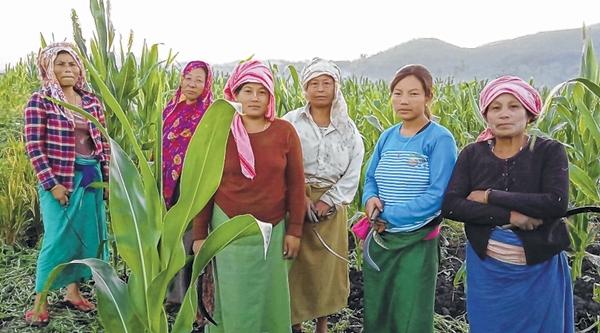Women SHGs show the way with vermicompost
Source: The Sangai Express / Ng Liklaileima Arambam
Imphal, October 18 2022:
Women's Self Help Groups (SHGs) at Huikap under Andro Constituency have been playing a significant role in increasing farm output of the State by making vermicomposts and planting winter crops (Rabi) in the post rice harvest season.
There altogether are 38 SHGs in Huikap and they have been engaged in farm activities under National Rural Livelihood Mission to provide a source of livelihood to women belonging to economically backward classes.
These SHGs have been making vermicomposts to produce organic manure and planting Rabi crops after harvesting rice on land measuring 20 sangams at Poirou Loukon to increase farm outputs of the State.
Scientists at Central Agricultural University (CAU), Imphal and KVK, Andro have also been providing seeds and training to the SHGs to equip women with technical know-how on making vermicomposts and plantation of winter crops.
|
Speaking to The Sangai Express, president of Huikap Women Development Village Level Federation, Keithellak-pam Sabitri said that the formation of women's SHGs started in 2017 under National Rural Livelihood Mission at Huikap and the number has now increased to 38 .
Saying every SHG has 10 to 12 members, she added that at least two Village Level Federations (VLFs) have also been formed at Huikap to supervise the function of the 38 SHGs.
Sabitri said that Lanchenbi SHG has been making vermicomposts since 2018 while select members of the 38 SHGs have been planting winter crops at Poirou Loukon since 2018-19 .
On preparation of organic manure, Sabitri stated that she received training on making vermicomposts from KVK, Andro before the formation of SHGs at Huikap.
Continuing that she has been sharing the knowledge of making vermicomposts with the members of SHGs since then, Sabitri maintained that earthworms used in making vermicompost are being brought from Nongdam Village in Imphal East.
Further stating that a shed with roof attached has been erected for the sole purpose of making vermicomposts, Sabitri added that first a compartment (tank) with a tube attached has to be prepared and filled with leftover vegetables, straws and cow dungs compactly and the earthworms are placed on top of it before covering the tank with a thick cloth.
Water has to be sprayed to the tank at least once a week, she said and maintained that the number of earthworms will increase after they start laying eggs.
Saying that excrement of the earthworms can be taken out after three months and the same process can be done three times a year, Sabitri maintained that the fluid from the tank as well as the compost itself can be used as an organic manure in plantations.
Sabitri further said that Lanchebi SHG has four vermicompost tanks and a single tank produces about 1000 kgs of compost in every unpacking.
She also maintained that a kilogram of the vermicompost is being sold at around Rs 20,000 to Rs 25,000 in the market.
Continuing that the composts are mostly bought by organic farmers and the demand of it in the market is high, Sabitri said that the profit from sale of composts is being shared by the members of SHGs after keeping some amount as common fund aside.
Member of Emoinu Women Building SHG, Sunandi maintained that two-third members of VLFs at Huikap are being engaged in plantation of Rabi crops post rice harvest season.
Sunandi continued that they have been planting crops which don't require much water such as mustard and peas due to lack of irrigation facilities.
Saying that planting mustards and peas is profitable, she said that the crops are also being purchased by KVK, Imphal East, apart from marketing it themselves.
Sunandi also said that they will consult with the experts at KVK, Imphal East and CAU, Imphal for plantation of some other crop varieties such as maize, black lentil etc.
She thanked CAU, Imphal and KVK, Imphal East for upskilling the women of Huikap to increase their earnings.
The news story is written under the Media Fellowship Programme of Public Relation and Media Management Cell, CAU on Scientific Journalism in Application of Science in Agriculture.
For further information, one may contact Dr Indira Thounaojam through [email protected] .








